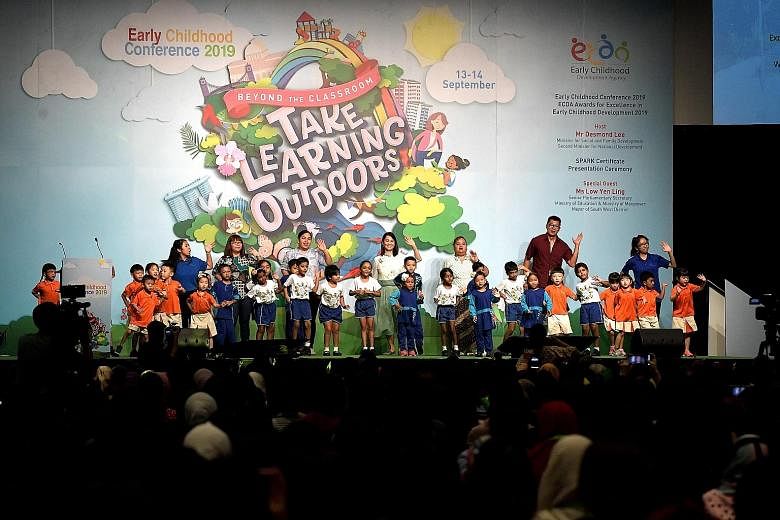More children from low-income families will get help under the KidStart programme, as the household income ceiling goes up from $1,900 to $2,500, Minister for Social and Family Development Desmond Lee announced yesterday.
Speaking at the Early Childhood Conference, he also announced an initiative where companies and individuals can partner the Government to help children under KidStart.
KidStart, a government pilot programme to help children up to age six from low-income families, began in 2016 and has helped about 1,000 families since. It supports families in areas such as nutrition, child development and parent-child interaction.
It was announced at the National Day Rally in August that the pilot programme would be expanded to benefit another 5,000 families.
Next year, the expansion will cover more locations in Singapore, with priority for areas with Community Link (ComLink) centres such as Kembangan-Chai Chee and Marsiling, said Mr Lee.
ComLink centres are where government agencies and community partners work together to help families living in rental blocks.
In the first round of the pilot, the programme targeted children from low-income families in Bukit Merah, Kreta Ayer, Boon Lay, Taman Jurong and Geylang Serai.
Companies and individuals who wish to contribute to KidStart can do so through the Growing Together with KidStart initiative from next year. They can partner a KidStart community through volunteering or providing families with items such as milk and diapers, transport to attend pre-school or KidStart programmes, or learning resources.
Those interested can also donate money to top up the Child Deve-lopment Accounts of KidStart children, which will be matched by the Government up to a certain cap.
Mr Lee said feedback from existing partners and other organisations has shown that they wanted to do more.
"We hope that our children on KidStart will grow together with well-wishers and volunteers, in their relationships and interactions," Mr Lee added on the first day of the two-day conference held at the Suntec Singapore Convention and Exhibition Centre.
The event, organised by the Early Childhood Development Agency, is a platform for professionals and parents to keep up with trends, share practices and build networks.
In line with the theme this year, Beyond The Classroom: Take Learning Outdoors, Mr Lee announced that two prototype outdoor learning spaces will be launched in Bukit Batok and Jurong West to test how existing pre-schools in Housing Board estates can tap the environment outside their centres for outdoor learning.
In Jurong West, the prototype will introduce ways to allow easier access going from indoors to outdoors, such as by extending the centre's window to an outdoor open area.
The second prototype in Bukit Batok will create outdoor learning trails, such as music walls with old pots and pans and obstacle courses using recycled items.
The National Institute of Early Childhood Development will also introduce courses for early childhood educators on outdoor learning next year, and offer training for centre leaders on how to support teachers carrying out outdoor learning.
As he concluded his speech, Mr Lee said: "The next frontier (for the early childhood sector) requires us to forge strong partnerships, in the intersection of government, civil society and enterprise.
"This approach is a key part of our vision for a society that cares, that creates opportunities for all."
At the conference, 112 pre-schools received their Singapore Pre-school Accreditation Framework (Spark) certifications from Senior Parliamentary Secretary for Education Low Yen Ling.
Spark is a benchmark to assess and increase the quality of programmes in pre-schools. Ms Low said 951 centres have been certified since the framework was introduced in 2011, making up more than half of the early childhood sector.
She also announced a new Spark quality rating scale that would cover programmes for children from birth until age six from next year. The current scale applies to programmes for ages four to six, and programmes for children from birth to three years of age are assessed only via self-appraisal.
"As we strive to make pre-schools more affordable and accessible, it is important that we continue to raise the quality of pre-school education," said Ms Low.


